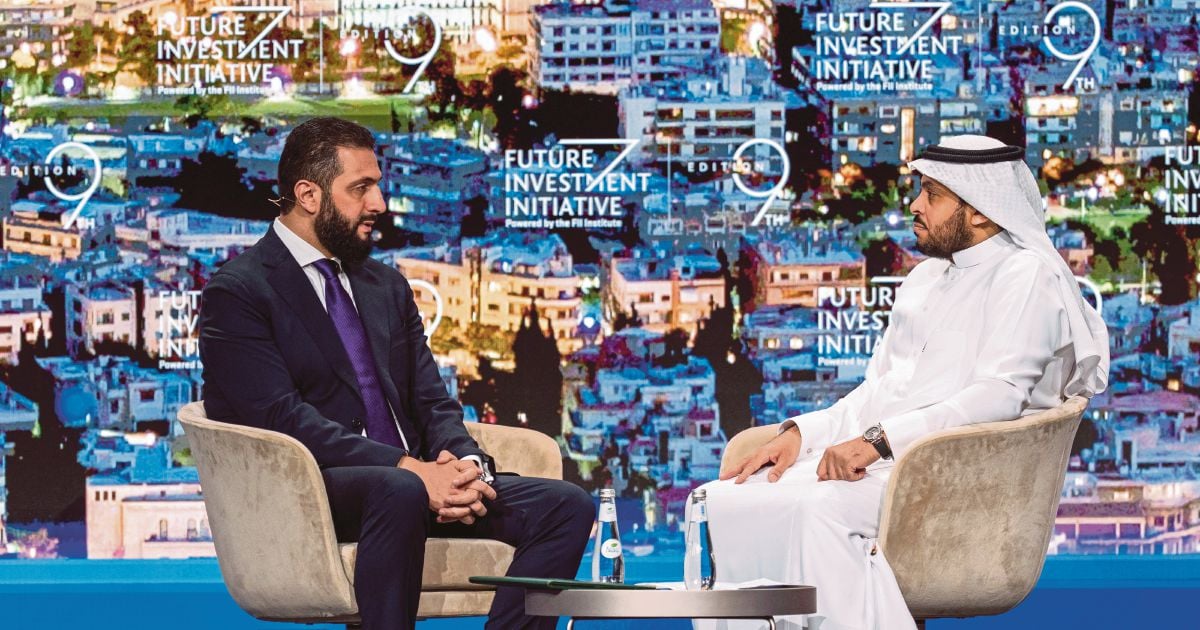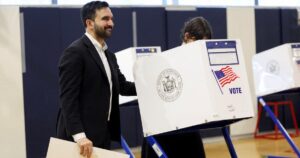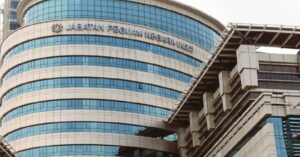“I DIDN’T know the salaries the government pays were this high!” Syrian President Ahmed al-Sharaa joked after more than 100 loyalists arrived at his former rebel base, many pulling up in luxury sport utility vehicles.
“Have you forgotten you are the sons of the revolution?” Sharaa rebuked the gathered officials and business leaders, according to two people present, remarking upon the large number of Cadillac Escalades, Range Rovers and Chevrolet Tahoes parked outside.
“Have you been tempted so quickly?”
Syria’s militant commander-turned-ruler has faced a turbulent 10 months since toppling President Bashar al-Assad after 14 years of civil war.
The country has suffered sporadic bouts of sectarian violence involving ex-rebel factions linked to his new government and there’s been a spate of forced evictions and property seizures.
The meeting on Aug 30, which hasn’t been reported before, took place at Sharaa’s former headquarters in Idlib province in northwestern Syria, far from his official presidential offices in Damascus.
The leader, a one-time al-Qaeda commander, was flanked by two senior security officials as he spoke.
Sharaa ordered civil servants with luxury cars to hand over the keys or face being investigated for illicit gains, according to the two attendees as well as two civil servants briefed on the address, who all requested anonymity to discuss confidential matters.
A handful of keys were handed in as people filed out at the end, said the attendees.
The message delivered to loyalists points to a critical challenge facing the 43-year-old president, according to Syrian officials and analysts: how to pivot from an insurgency to a civilian government without replicating the endemic corruption of Assad’s reviled police state.
At stake: the legitimacy Sharaa has gained among many Syrians, and abroad, by ousting the dictator.
“Sharaa lacks any institutional framework or textbooks to rely on,” said Hossam Jazmati, a Syrian researcher who has studied the former warrior-sheikh for more than a decade.
“He’s not a product of a state institution but of a faction. Since 2003, he has operated within a militia environment,” he said. “Power was based on alliances, favouritism and monopoly.”
Now, loyalists taking spoils of war would threaten his ability to consolidate power, said Jazmati.
“He requires substantial financial resources to sustain his administration — not necessarily for personal gain, but to maintain authority.”
Syria’s Information Ministry said Sharaa had arranged a “friendly, informal meeting” in Idlib with former commanders, officials and other notables which touched on political and security challenges as well as the need to change the “investment culture established by the former regime”.
It denied any car keys were handed over. Sharaa’s balancing act can be seen even within his own family.
Two older brothers hold top jobs in the new government. Hazem oversees foreign and local business and investment in Syria, including the work of former rebel fighters tasked with overhauling Syria’s economy.
Maher, a gynaecologist with Syrian-Russian dual nationality, is secretary-general of the presidency, chairing official meetings and attending talks with foreign dignitaries, including Sharaa’s meeting with President Vladimir Putin in Moscow this month.
Multiple Syrian officials said Sharaa’s reliance on relatives and others close to him was a result of needing to quickly fill gaps in his new administration following the unexpected collapse of Assad’s government. Critics see it as a worrying emulation of family rule under the old regime.
But another elder brother — Jamal, a businessman — has fallen foul of Sharaa’s fledgling anti-corruption drive, according to people familiar with the matter.
Following Sharaa’s rise to power, he became a common sight in upmarket hotel lobbies and restaurants, to which he was driven in a black Mercedes S-class saloon with tinted windows and no licence plates.
Sharaa ordered the office be shut in August and instructed government entities not to deal with his brother, said the sources.
The decision concerned allegations that Jamal had used his family link to the president to set up dozens of meetings with government and business figures to advance his personal interests.
Corruption, nonetheless, persists in post-Assad Syria, including payment of bribes to get out of jail or recover properties, vehicles and other valuables seized by members of the new ruling order, according to business figures and former and current officials.
* The writers are from Reuters
© New Straits Times Press (M) Bhd






![[UPDATED] Muhyiddin to review Bersatu Appeals Board findings amid internal rift](https://prwire.my/wp-content/uploads/2025/11/UPDATED-Muhyiddin-to-review-Bersatu-Appeals-Board-findings-amid-internal-300x157.jpg)